Roofing Companies Lees
Find the best Roofing Services in Lees
Receive up to 3 Roofers quotes for your project today! Compare profiles, reviews, accreditations, portfolio, etc... and choose the best offer.
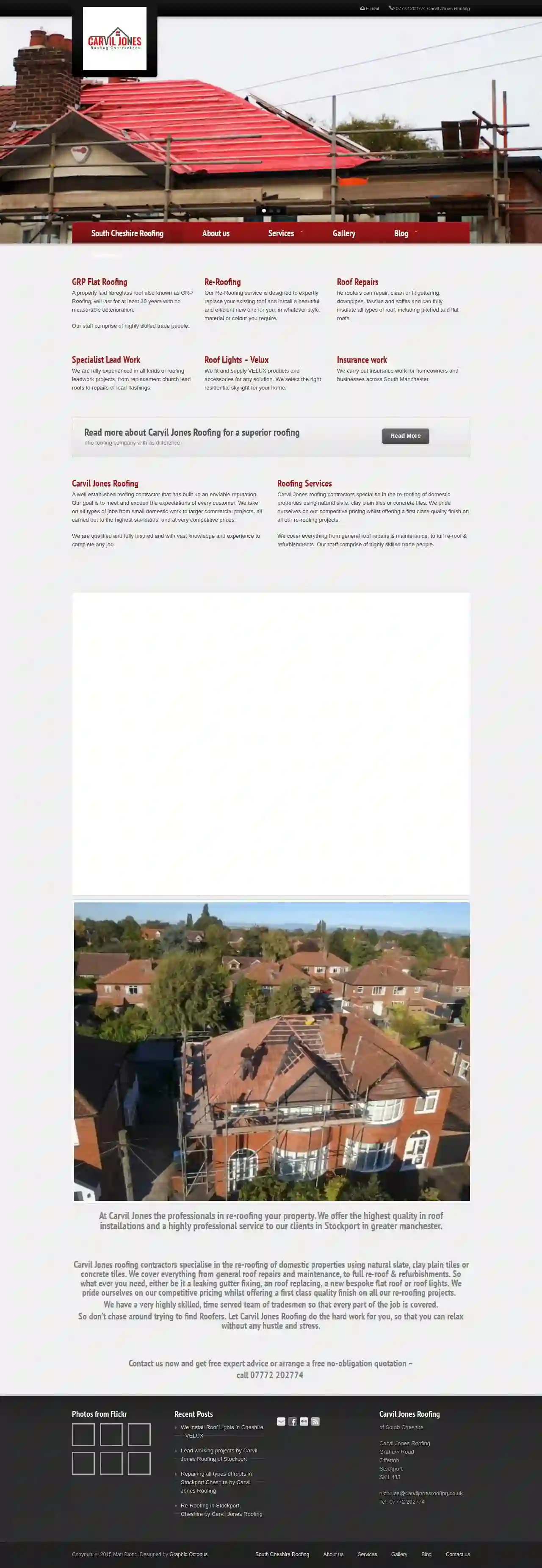
Carvil Jones Roofing
4.819 reviewsOfferton, Graham Road, Stockport, SK1 4JJ, GBCarvil Jones Roofing is a well-established roofing contractor with an enviable reputation. We aim to exceed customer expectations by taking on all types of jobs, from small domestic work to larger commercial projects. Our work is carried out to the highest standards at very competitive prices. We are qualified, fully insured, and have vast knowledge and experience to complete any job. We specialise in re-roofing domestic properties using natural slate, clay plain tiles, or concrete tiles. Our services include general roof repairs and maintenance, full re-roofing and refurbishments. We pride ourselves on competitive pricing and a first-class quality finish on all our projects. Our highly skilled team of tradesmen ensures every aspect of the job is covered. Contact us now for free expert advice or a free no-obligation quotation.
- Services
- Why Us?
- Gallery
Get Quote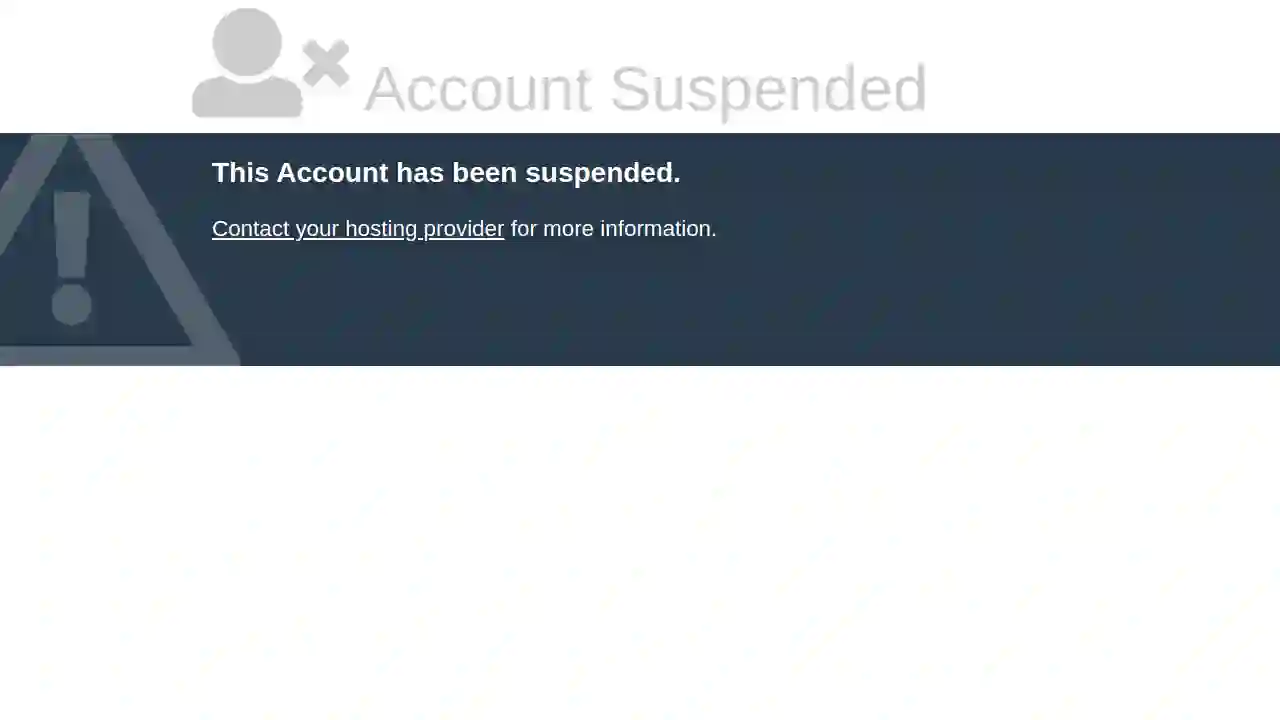
Roof Repairs Stockport
55 reviewsGBRoof Repairs Stockport is an independent roofing services provider, offering a local and friendly service around Stockport for generations with over 45 years of experience. All our friendly tradesmen are fully qualified roofers with years of expertise, providing the best quality job with a smile on their faces. We aim to be polite, friendly and most of all get the job done. All work is carried out to the highest quality of standard, we don't stop, until you are satisfied. We provide a full range of roofing services, from gutter cleaning to brand new roofs and everything in between. All our work comes with a guarantee, as well as before & after pictures with a written summary. If you would like an in-depth look at all our available roofing services, please click on your chosen category on the services bar down below. If you have any further questions or would simply like a free non-obligational quote, please don't hesitate to ring us. Call now for a free NON-OBLIGATIONAL quote: 0161 327 4152 All new roofs come with before & after pictures as well as a written 10-year guarantee, Roof Repairs Stockport can do it for you
- Services
- Why Us?
- Gallery
Get Quote
Best Rated Roofers
4.47 reviewsOak Compass Road Pattiswick Braintree Essex, Braintree, CM77 8BG, GBBest Rated Roofing Ltd is a local, trusted roofing installation and repair company covering Essex and the surrounding areas. Our team of roofers has many years’ experience within the roofing industry and we are fully qualified and insured in all aspects of domestic, commercial and industrial roofing. From a simple roof repair to a complete re-roof, replacement flat roof or fascias, soffits and guttering, you will receive a free, no-obligation survey, a written quotation and a service that will leave you completely satisfied with the work carried out and, guess what, its all fully guaranteed!
- Services
- Why Us?
- Gallery
Get Quote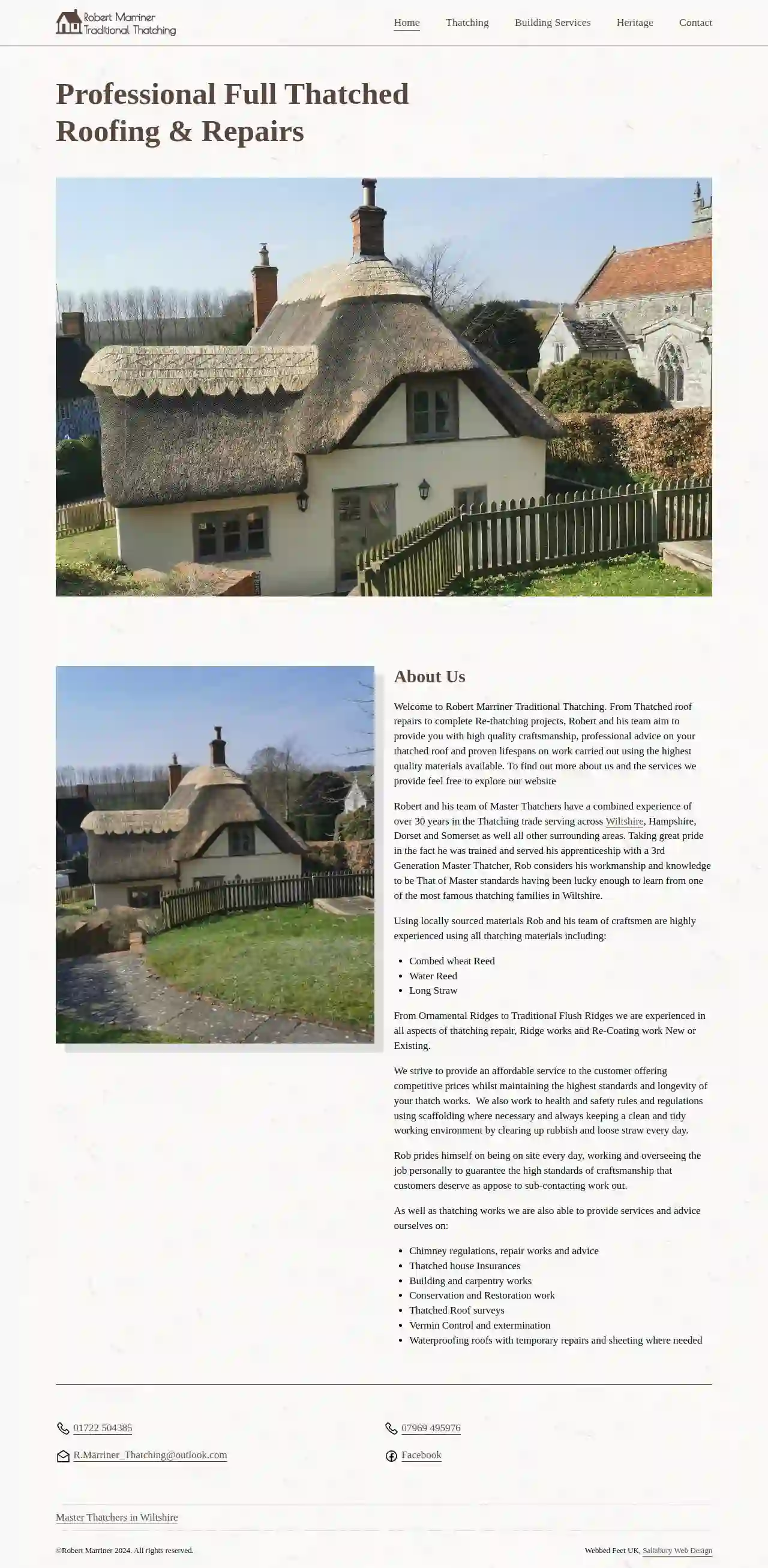
Robert Marriner Traditional Thatching- Master Thatcher
53 reviewsBury, GBWelcome to Robert Marriner Traditional Thatching. From Thatched roof repairs to complete Re-thatching projects, Robert and his team aim to provide you with high quality craftsmanship, professional advice on your thatched roof and proven lifespans on work carried out using the highest quality materials available. To find out more about us and the services we provide feel free to explore our website. Robert and his team of Master Thatchers have a combined experience of over 30 years in the Thatching trade serving across Wiltshire, Hampshire, Dorset and Somerset as well all other surrounding areas. Taking great pride in the fact he was trained and served his apprenticeship with a 3rd Generation Master Thatcher, Rob considers his workmanship and knowledge to be That of Master standards having been lucky enough to learn from one of the most famous thatching families in Wiltshire. Using locally sourced materials Rob and his team of craftsmen are highly experienced using all thatching materials including: Combed wheat Reed, Water Reed, Long Straw. From Ornamental Ridges to Traditional Flush Ridges we are experienced in all aspects of thatching repair, Ridge works and Re-Coating work New or Existing. We strive to provide an affordable service to the customer offering competitive prices whilst maintaining the highest standards and longevity of your thatch works. We also work to health and safety rules and regulations using scaffolding where necessary and always keeping a clean and tidy working environment by clearing up rubbish and loose straw every day. Rob prides himself on being on site every day, working and overseeing the job personally to guarantee the high standards of craftsmanship that customers deserve as appose to sub-contacting work out. As well as thatching works we are also able to provide services and advice ourselves on: Chimney regulations, repair works and advice, Thatched house Insurances, Building and carpentry works, Conservation and Restoration work, Thatched Roof surveys, Vermin Control and extermination, Waterproofing roofs with temporary repairs and sheeting where needed.
- Services
- Why Us?
- Our Team
- Gallery
Get Quote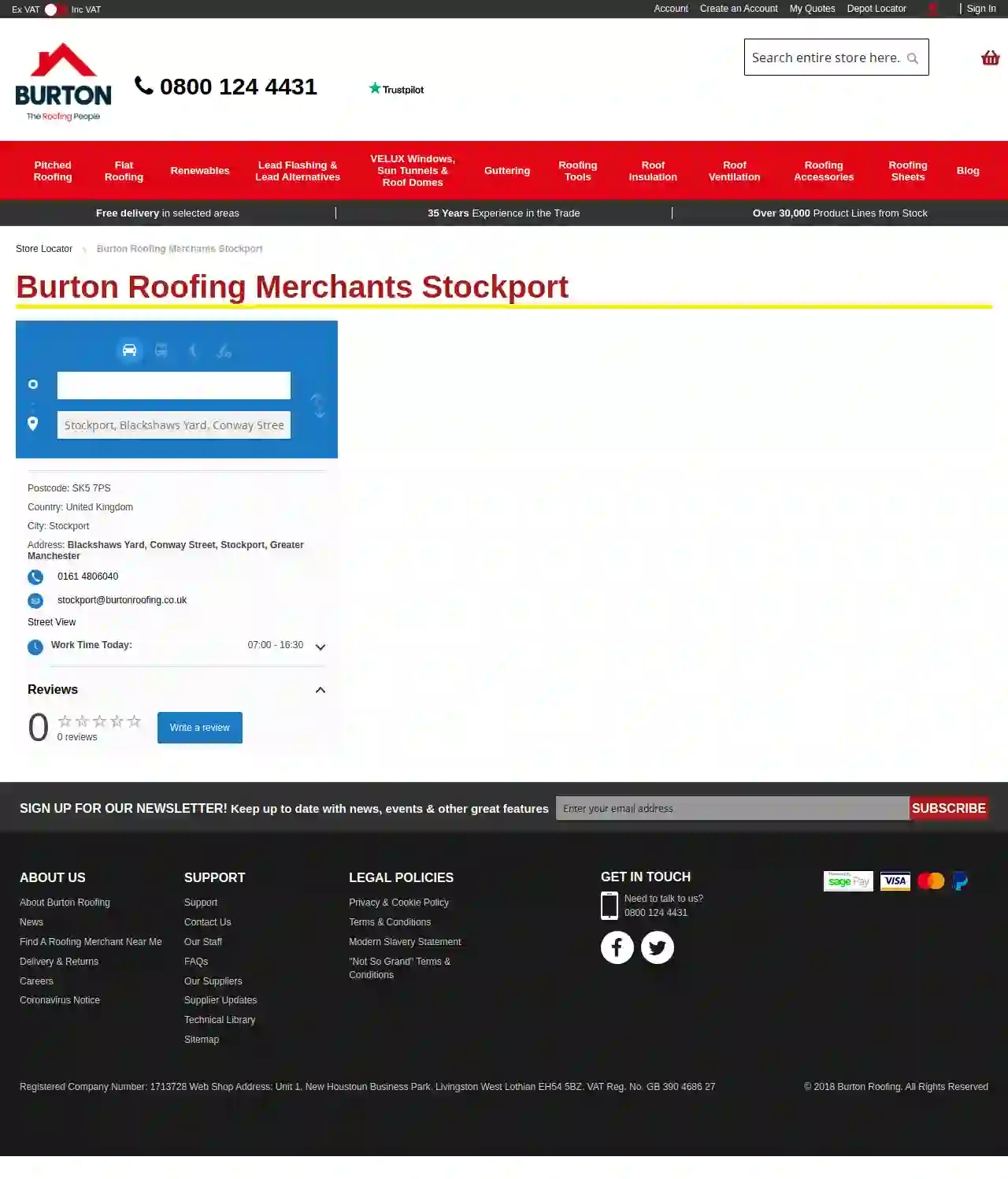
Burton Roofing Merchants - Stockport
4.563 reviewsBlackshaws Yard, Conway Street, Stockport, SK5 7PS, GBBurton Roofing Merchants is a leading supplier of roofing materials with over 35 years of experience in the trade. We offer a wide range of products from over 30,000 lines, all available from stock. Our team of fully trained staff are on hand to provide expert advice and support. We pride ourselves on our commitment to customer service and strive to provide a seamless experience for all our customers. With a nationwide network of branches, we are conveniently located to serve your needs.
- Services
- Why Us?
- Gallery
Get Quote
J Mac Roofing & Building
510 reviewsManchester, GBJ Mac Roofing & Building serves as the leading Roofing Contracting firm in the Manchester area. We’re a team of fully-certified professionals who tackle everything from complex large projects to smaller scale jobs. Fuelled by our commitment to excellence, we go the extra mile to make sure our clients are completely satisfied with our work. From slate replacement to large new roof installations, we specialise in all aspects of slated, tiled, flat and fibreglass covered roofs. We only use high-quality materials for all our roofing work so you can be sure that your roof will be strong and durable for years to come. About J Mac Roofing & Building Benefiting from many years of experience, J Mac Roofing & Building is a top provider of roofing services as well as specialist roof repair services in Manchester along with the surrounding area. Our company is recognised as one of Manchester’s main roofing companies, a roofing specialist with an valued reputation for supplying a top notch roofing service. We’ll take on any size job, from a small roof repair through to a full roof replacement which includes pitching up of flat roofs, felt roofs, conservatory roofing, Velux windows and uPVC roof line replacement. All our staff reflect our organisation beliefs and therefore follow our high-standard of customer support, your residence will be taken care of while using the utmost respect always.
- Services
- Why Us?
- Gallery
Get Quote
AD Roofcare
52 reviewsPetersgate, PROFOLK Bank Chambers Street, Stockport, SK1 1AR, GBWelcome to AD Roofcare, local roofing contractors that provide an affordable service for roof replacements, roofing repairs, chimney repairs, gutter replacements and more. Our services range from replacing roofs, roof tiling and felt roofing to fixing roofs, leaks and gutter replacements. If you think you need help with your roof, we provide a free roof inspection service. All our roof replacement and repair work is done to industry-approved standards, covered by a 12 Year Guarantee. Our team has full public liability insurance and is trained to work safely and to approved regulations. We are a 3rd generation roofing company with over 30 years of experience working on residential roofs, flat roof extensions, garages and conservatories. From roof inspections to roof repair and total roof replacement, we have you covered by the best roofing contractors in the business.
- Services
- Why Us?
- Gallery
Get Quote
Wardley Hall Windows & Conservatories Ltd
4.795 reviews5 Cecil Street, Walkden, M28 3BR, GBWardley Hall Windows & Conservatories Ltd is a family-run business based in Walkden, Manchester, with over 35 years of experience in the double glazing industry. We offer a wide range of products, including windows, doors, conservatories, porches, roofline, garden rooms, canopies, and glass balustrades. We pride ourselves on providing exceptional customer service and high-quality, cost-effective installations. Our commitment to this mission allows us to become not only a premier installation company but THE premier installation company in the North West. We treat all employees fairly and involve them in the quality improvement process to ensure responsiveness and cost-effective work execution. We offer free helpful advice to all of our customers and no obligation quotes are also available. If you prefer to view before you buy, you can also visit our showroom at 5 Cecil Street, Walkden, Manchester, M28 3BR. Most of our work is gained through high recommendation and great testimonials from previous customers in Greater Manchester and the surrounding areas. Our commitment to customer satisfaction is our priority – if you aren’t happy, then neither are we. As an ASSURE registered company, we adhere closely to their code of conduct and our high standards are independently assessed on a regular basis. All of our work has an insurance backed 10 year guarantee with DGCOS (Double Glazing and Conservatory Ombudsman Scheme). We understand the importance of completing projects on time, within budget and to our own high standards and will keep you informed through every step of your project.
- Services
- Why Us?
- Accreditations
- Gallery
Get Quote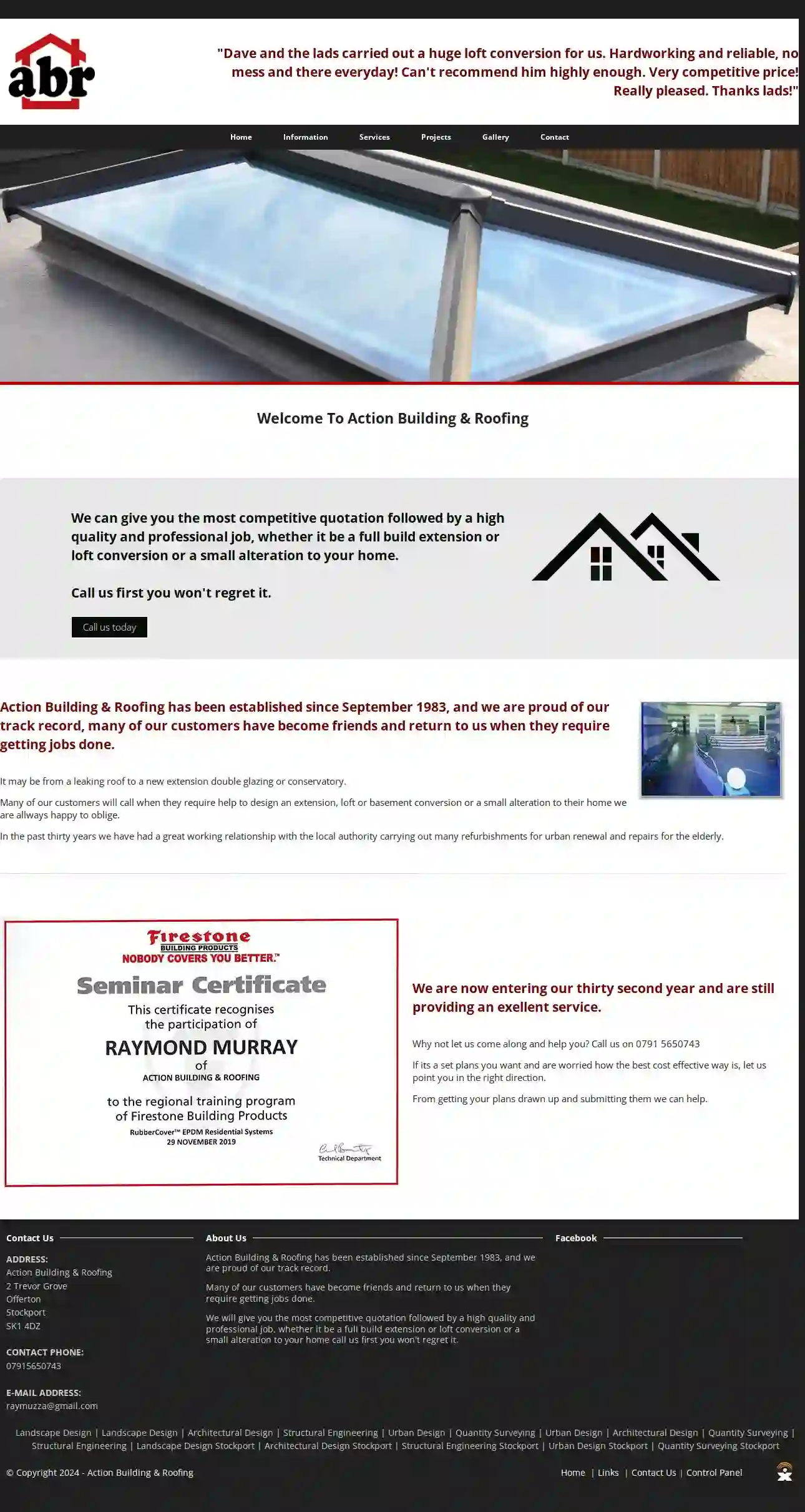
Action Building Roofing
51 reviews2 Trevor Grove, Offerton, SK1 4DZ, GBAction Building & Roofing has been established since September 1983, and we are proud of our track record. Many of our customers have become friends and return to us when they require getting jobs done. We can give you the most competitive quotation followed by a high quality and professional job, whether it be a full build extension or loft conversion or a small alteration to your home. Call us first you won't regret it. In the past thirty years we have had a great working relationship with the local authority carrying out many refurbishments for urban renewal and repairs for the elderly. We are now entering our thirty second year and are still providing an excellent service. Why not let us come along and help you?
- Services
- Why Us?
- Gallery
Get Quote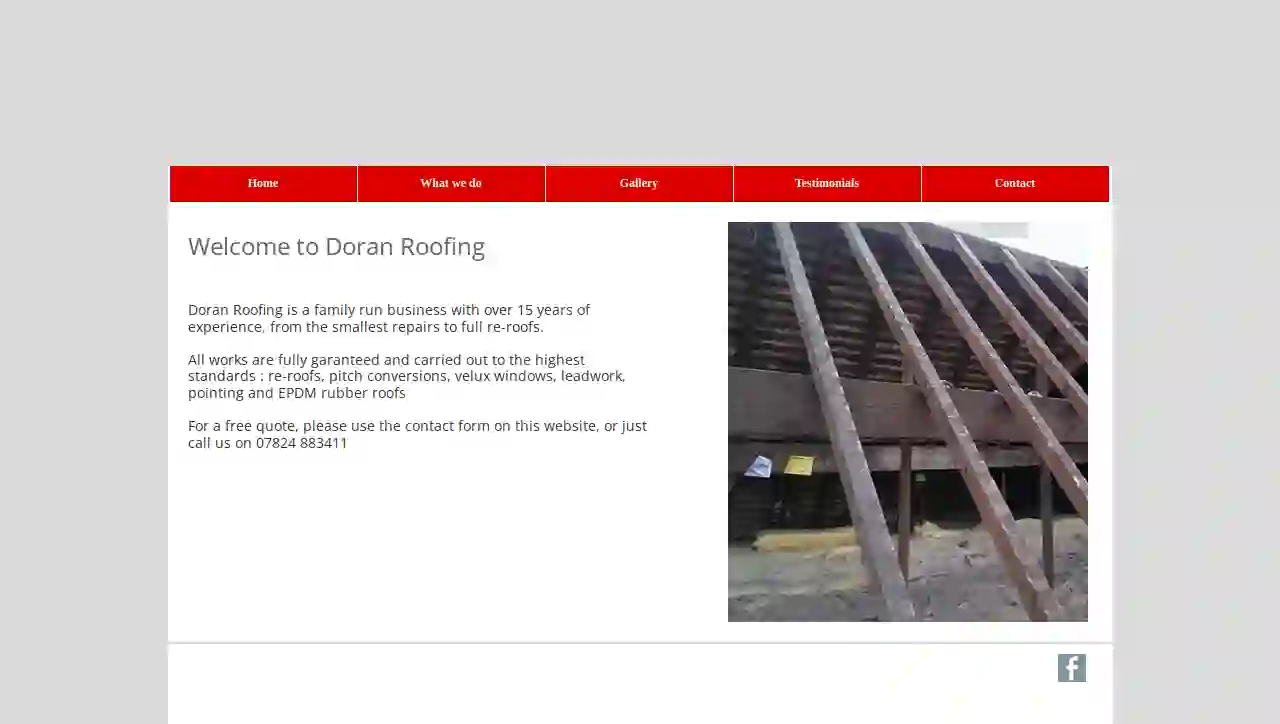
Doran roofing Ltd
528 reviewsGBDoran Roofing is a family run business with over 15 years of experience, from the smallest repairs to full re-roofs. All works are fully guaranteed and carried out to the highest standards: re-roofs, pitch conversions, Velux windows, leadwork, pointing and EPDM rubber roofs. For a free quote, please use the contact form on this website, or just call us on 07824 883411.
- Services
- Why Us?
- Testimonials
- Gallery
Get Quote
Over 12,314+ Roofers registered
Our roofing pros operate in Lees and surroundings!
Roofyng.co.uk has curated and vetted the Best Roofers in Lees. Find the most reliable contractor today.
Frequently Asked Questions About Roofing Companies
- Asphalt Shingles: 20-30 years
- Metal Roofing: 40-70 years
- Tile Roofing: 50-100 years or more (clay and slate)
- Flat Roofing: 15-30 years (depending on material)
- Slate: 100 years or more
- Wood Shakes or Shingles: 30-50 years (with proper maintenance)
- Clear the Area: Remove any vehicles, outdoor furniture, or other items from around your house to provide the roofing crew with easy access.
- Protect Landscaping: Cover plants, shrubs, and other landscaping elements near the house with tarps or plastic sheeting to protect them from falling debris.
- Clear the Attic: Remove or cover items stored in your attic, as dust and debris might fall through during the removal of the old roof.
- Notify Neighbors: It's courteous to inform your neighbors about the upcoming roof replacement project, especially if it's likely to be noisy or disruptive.
- Discuss Logistics with the Contractor: Coordinate with the roofing contractor regarding access to your property, parking arrangements, and any special instructions or concerns you have.
- Metal roofs: Reflect sunlight, reducing cooling costs.
- Tile roofs: Offer thermal mass, regulating temperature.
- Cool roofs: White or light-colored roofs with high solar reflectance.
- Green roofs: Vegetated roofs providing insulation and reducing heat absorption.
- Home Improvement Loans: Offered by banks or credit unions.
- Home Equity Loans or Lines of Credit: Use your home's equity as collateral.
- Government Programs: Check for energy efficiency rebates or grants.
- Contractor Financing: Some roofing companies offer financing plans.
How long does a roof typically last?
How do I prepare for a roof replacement?
What are some energy-efficient roofing options?
How can I get financing for a new roof?
How long does a roof typically last?
- Asphalt Shingles: 20-30 years
- Metal Roofing: 40-70 years
- Tile Roofing: 50-100 years or more (clay and slate)
- Flat Roofing: 15-30 years (depending on material)
- Slate: 100 years or more
- Wood Shakes or Shingles: 30-50 years (with proper maintenance)
How do I prepare for a roof replacement?
- Clear the Area: Remove any vehicles, outdoor furniture, or other items from around your house to provide the roofing crew with easy access.
- Protect Landscaping: Cover plants, shrubs, and other landscaping elements near the house with tarps or plastic sheeting to protect them from falling debris.
- Clear the Attic: Remove or cover items stored in your attic, as dust and debris might fall through during the removal of the old roof.
- Notify Neighbors: It's courteous to inform your neighbors about the upcoming roof replacement project, especially if it's likely to be noisy or disruptive.
- Discuss Logistics with the Contractor: Coordinate with the roofing contractor regarding access to your property, parking arrangements, and any special instructions or concerns you have.
What are some energy-efficient roofing options?
- Metal roofs: Reflect sunlight, reducing cooling costs.
- Tile roofs: Offer thermal mass, regulating temperature.
- Cool roofs: White or light-colored roofs with high solar reflectance.
- Green roofs: Vegetated roofs providing insulation and reducing heat absorption.
How can I get financing for a new roof?
- Home Improvement Loans: Offered by banks or credit unions.
- Home Equity Loans or Lines of Credit: Use your home's equity as collateral.
- Government Programs: Check for energy efficiency rebates or grants.
- Contractor Financing: Some roofing companies offer financing plans.